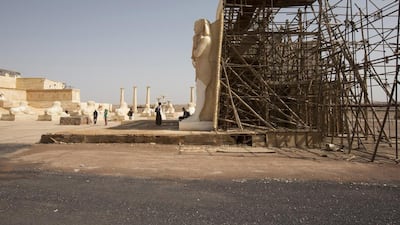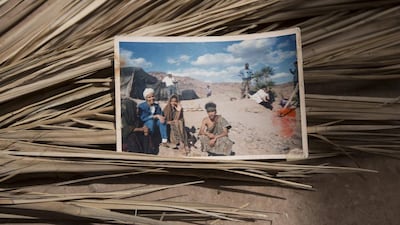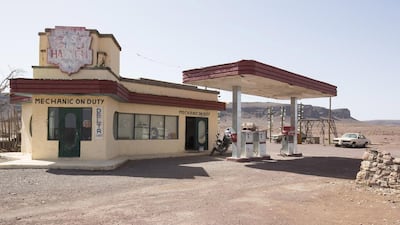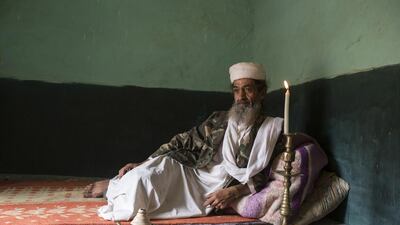It’s mid-morning when Osama bin Laden leaves his barren, dark, one-room house. Dressed in his usual white robe, military jacket and white cap, he crosses the courtyard, leaving few grains for the birds before exiting the crumbling, mud-and-straw compound. “My dream would be to live and fly just like them” he says with a broad smile lighting up his calm, wrinkled face. “At my age, there’s not much I can demand from this world.”
Once outside, his unmistakable, salt-and-pepper beard attracts so much attention from friends, acquaintances and curious tourists that it takes the old man at least 10 minutes to reach the nearby cigarette shop he runs. Here, hung along the walls of this minuscule space, are some of the man's dearest memories. "This is me playing in The Ten Commandments with Omar Sharif. Here I was reciting in Prince of Persia, this is Prison Break."
Nicknamed Osama bin Laden for his striking resemblance to the deceased Al Qaeda leader, 59-year-old Abdelaziz Bouyadnaine is a background actor who has appeared in more than 100 movies, television series and documentaries. “I love this job. It has given me the opportunity to meet top foreign actors,” says the man whose career, spanning three decades, has seen him perform alongside the likes of Orlando Bloom, Brad Pitt and Jean-Claude Van Damme.
Bouyadnaine lives in Ouarzazate, a Moroccan desert town at the forefront of the world's cinema industry. Thanks to its picturesque Casbah, silent desert and snow-capped mountains, this enchanting oasis of 70,000 people has a variety of natural settings that have been used in different movies, from the all-time-classics Lawrence of Arabia and The Living Daylights to modern blockbusters such as Gladiator, The Mummy and Kingdom of Heaven and recent hit television series such as Prison Break and Game of Thrones. Once a small military outpost, today Ouarzazate boasts two cinema studios for local and international productions and several five-star hotels for its international guests.
Decades of filming have developed the skills of hundreds of local background actors, who are recruited on a regular basis. A versatile bunch, these movie professionals have played Tibetans, biblical refugees, slaves in ancient Egypt and ISIL fighters. They are the unsung heroes of cinema who appear in countless movies, without ever being noticed. Inactive for months between one production and the next, during shoots they work up to 16 hours a day for a paltry pay of €15 (Dh61) to €25. After dedicating their lives to cinema, most of them end up with no pension and without having earned enough to secure their old age.
“I can do any kind of role. I do this job because I love it,” says Saadiya Guardienne, a middle-aged woman, who is even able to cry at command.
Like her, many live within the narrow, crumbling alleys of the Casbah Taourirt, Ouarzazate's charming Old City. Thanks to her expressive features and hazel eyes, 11-year-old Fatima Zahra Al Hassani has already appeared in several movies. "I was one-and-a-half years old when I did my first one," she says under the satisfied gaze of her mother and several siblings sitting in the family's crammed living room. Fatima's biggest role so far is in 2015's Rock the Kasbah, a Barry Levinson movie starring Bill Murray, where she plays an Afghan girl who steals some flour from a shop in order to feed her poor mother. "I liked that movie a lot, but I prefer Cleopatra, where I was dressed like a little princess," she adds with a smile. Although her dream is to become a world-class actress, her mother doesn't let her skip school to play an ordinary extra, but makes exceptions when she is signed up for some bigger roles. "They can be paid up to €50 per day. That money helps our family a lot," she confesses.
Located on the outskirts of town, Atlas and CLA studios host the bulk of the shootings. Walking through their gates is a surreal trip into the heart of cinema. Amid the sweltering desert arise Jerusalem, Egyptian temples, Afghan villages, Greek villas and Crusaders’ castles – all perfectly reproduced.
Atlas was built in 1984 for The Jewel of the Nile, starring Michael Douglas and Kathleen Turner. The fake fighter-bomber used in the film and an autographed picture of the two actors still adorns the entrance of the studio. Three years later, a real heavyweight came into town. "At that time I was head of the Moroccan Cinematographic Center and Martin Scorsese was having a hard time finding a shooting ground for The Last Temptation of Christ because of his controversial plot," recalls 74-year-old Moroccan film director Souheil Ben Barka. "When he asked to do it in Ouarzazate, we gave him everything he wanted. After flying back to the US, he [gave us] great publicity within the industry."
In 2015, Morocco hosted 46 foreign productions, including long and short movies, telefilms and TV series – 65 per cent of which were made in Ouarzazate. According to the Ouarzazate Film Commission, the costs of production there are between 30 and 50 per cent lower than in the West, thanks to a combination of fiscal incentives, cash refunds and low-waged, skilled technicians. “Some of them are among the best in the world” says Ben Barka. “The first American productions used to bring 150 foreign technicians and give work to 20 locals. Now the proportions have been reversed.”
Yet, convincing locals to participate wasn't easy at first. In the 80s, the society was quite traditional and featuring in movies, especially for women, wasn't well-regarded. Productions often had to bring extras from cities such as Casablanca and Marrakech. "When The Jewel of the Nile came in town, I went to the casting out of curiosity. I was an orphan, so there was no one forbidding me," says Guardienne, one of the first local actors. Since then, this solemn-looking woman has featured in more than 50 movies, but her debut is still the one she remembers with most affection. "Kathleen Turner was so beautiful and kind. She had a lot of patience with all of us, even when we made mistakes," she says. "When I brought my daughter on the set, she gifted her with a lot of clothes."
Morocco's political stability and tolerance has also contributed to Ouarzazate's fortunes, making it a favourite destination to shoot films that are nominally set in war-torn countries such as Afghanistan and Pakistan. "Here there is great freedom of expression," says 55-year-old Khadija Alami, a local producer who has worked on Captain Phillips and whose company is currently co-producing the sixth series of the TV show Homeland. "When it comes to movies, the only prohibitions are pornography or scripts that denigrate our king or Islam."
The inhabitants of the Casbah still remember with amusement the filming of Rules of Engagement, a 2000 movie starring Tommy Lee Jones and Samuel Jackson, which revolves around an attack on the US embassy in Sanaa, Yemen, by a mob and the retaliation by the American army. "Hundreds of people signed up. The production had to hire the whole Casbah and pay the people not to leave their houses for the whole day," remembers Naceur Oujri, a 68-year-old background actor. "There were military helicopters flying over and fake explosions everywhere. It was a lot of fun."
Just like a movie set, this otherwise sleepy town springs back to life every time a new production arrives. While hundreds of background actors queue up for the castings, local artisans are contracted to restore and decorate the sets and to manufacture the necessary accessories and ornaments. Mbarek Arouaie, 50, has been working as a cinema artisan for the past two decades and can manufacture everything from Roman swords and helmets to Egyptians jewels and ornaments. His best memories are linked to Kundun, Scorsese's 1997 film on the life of the 14th Dalai Lama. "It was by far the biggest production we ever had" says Arouaie. "Hundreds of extras were brought from Asia to impersonate Buddhist monks. The film stayed in town for almost a year, giving work to the whole city." Kundun's still-intact temple is one of the main attractions at Atlas studios, but the proliferation of visual effects in modern cinema has lately dealt a blow to the local actors and artisan industry. "Before, productions used to order 3,000 copper swords to shoot a scene," says Arouaie. "Now they just order two or three and make the rest out of wood."
Arouaie's concerns are shared by the studios and the actors, who see their relevance in cinema threatened by computers. In a recent movie, set in ancient Egypt, the production hired just 20 extras for a temple scene, but added hundreds more in post-production. "The world is changing. Why build a movie set if you can reproduce it digitally at a lesser cost?" says Ben Barka. "Thanks to the digital effects, the recent TV series on Ben-Hur is much better than the original movie with Charlton Heston."
This poses new challenges to a city without industries and little tourism and whose economy is heavily dependent on cinema. Yet, after three difficult years caused by the global recession, Ouarzazate has recently seen a rebound with the hosting of Queen of the Desert, A Hologram for the King and this year's fifth season of Prison Break. Ben Barka predicts "2017 will be a good year". "A big Chinese-American production will shoot here for 10 months. It will be a huge project."
From her leafy house in Casablanca, Alami is so confident in the future that she is building her own studios in the oasis of Fint, a few kilometres outside Ouarzazate. Once completed, K Studios will resemble George Lucas’s Skywalker movie ranch in California, albeit on a much smaller scale. “The difference is that he moves around his property on helicopter, while I can still tour mine on foot,” she jokes. One of the next projects she would like to embark on is to build a movie theatre in Ouarzazate, as the “capital of cinema” hasn’t had one in decades.
Most background actors never get to see the movies they play in. From their destitute houses, the glittering cinema industry has a very different look. When productions are not in town, the majority of them survive by doing modest jobs just like Guardienne, who manages a small communal oven where local women bake flatbreads. “This is what I earn in a day” she says showing a few coins, the equivalent of €3. For her and for most of the actors in the Casbah, the dreams of a dazzling career end up in nothing. Once they retire, a few yellowed photos and their cinema memories are often the only thing they are left with. “I have had a very hard life, but I am not the only one here,” says Guardienne, this time wiping real tears off her eyes. “Next time I would like to play a role in which I change the lives of our people.”
Matteo Fagotto is a freelance journalist focusing on worldwide social and human rights issues.




